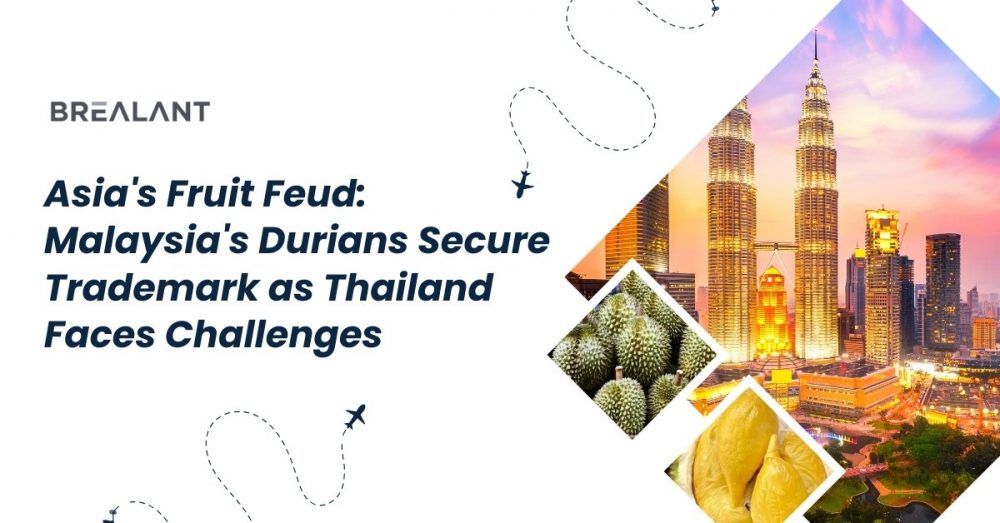In recent years, the culinary world has witnessed a fascinating and contentious rivalry between two Southeast Asian nations: Malaysia and Thailand. At the heart of Asia’s Fruit Feud is the beloved durian, often referred to as the “king of fruits.” Renowned for its distinctive smell and unique flavour, the durian has become a symbol of national pride for both countries. However, the recent trademarking of Malaysian durians has added a new layer of complexity to this fruity rivalry, prompting discussions on identity, commerce, and cultural heritage.
The Durian: A Cultural Icon
The durian (Durio) is more than just a fruit; it’s a cultural phenomenon in Southeast Asia. It has been celebrated in literature, music, and even folklore. In Malaysia, the durian is often associated with local festivals and culinary traditions, while in Thailand, it boasts a massive export market and is integral to the nation’s identity. Both countries have their own varieties, each with unique flavours and characteristics, making Asia’s Fruit Feud a point of pride. Malaysians often champion the Musang King variety, known for its creamy texture and sweet, bitter flavour, while Thais promote their famous Monthong durian, celebrated for its large size and custard-like flesh. As these countries vie for recognition on the international stage, the stakes continue to rise.
The Trademarking Controversy
In 2023, Malaysia’s Intellectual Property Corporation announced the successful registration of a trademark for its durians, specifically the Musang King variety. This move was seen as a significant step in protecting the country’s agricultural products and enhancing their global marketability. The trademark not only safeguards Malaysian durians from imitation but also positions them as a premium product in the global marketplace. However, this trademarking has not come without controversy. Thailand, which has long prided itself on its durian exports, views this development as a challenge to its own industry.
With durians being a vital part of Thailand’s agricultural exports—worth billions of dollars annually—many Thai farmers and businesses are concerned that Malaysia’s trademark could lead to confusion and market monopolization.
Economic Implications
The economic implications of this feud are profound. Malaysia’s successful trademarking could potentially give it a competitive edge, attracting more international buyers who are keen to differentiate between the high-quality Malaysian durians and their Thai counterparts. This could lead to an increase in prices for Malaysian durians, benefitting local farmers and the economy.
On the other hand, Thailand’s durian industry might face difficulties if the trademark leads to stricter regulations on marketing and branding. Thai farmers, many of whom rely on durian cultivation for their livelihoods, fear that their products may be overshadowed by the branded Malaysian fruit. This situation could trigger a ripple effect across the region, affecting everything from pricing strategies to consumer perceptions.
Cultural Significance and Heritage
Beyond the economic factors, this feud touches upon deeper issues of cultural identity and heritage. For both nations, the durian is a symbol of pride, deeply embedded in their cultures. The fruit is celebrated in festivals, featured in traditional dishes, and is a significant aspect of both countries’ agricultural practices.
Malaysia’s trademarking raises questions about the ownership of agricultural heritage. Critics argue that such legal protections might stifle the shared cultural practices that have historically allowed both countries to thrive together in the global market. The fear is that trademarking could create an environment where one nation’s identity is prioritised over another’s, leading to further tensions.
Consumer Perceptions
Consumer perceptions of durians vary widely across the globe. While Southeast Asians cherish the fruit, it often elicits strong reactions from international audiences. The distinct aroma can be off-putting to many, leading to a divided opinion on its taste and desirability. In markets like China, where durians have become increasingly popular, understanding the nuances of these different varieties becomes crucial for consumers.
The trademarking of Malaysian durians could play a pivotal role in shaping consumer perceptions. With a recognized brand behind the Musang King, it could enhance its appeal and lead to greater appreciation of its qualities, potentially increasing demand. However, this might also create a stigma against Thai varieties, leading to consumer biases that could impact market dynamics.
Collaboration Over Competition
While the rivalry between Malaysia and Thailand is palpable, there is a growing call for collaboration rather than competition. Both nations could benefit from working together to promote the durian as a regional specialty, leveraging their unique varieties to create a diverse and appealing product line for global consumers. Initiatives could include joint marketing campaigns, shared agricultural research, and cultural exchange programs that celebrate the durian in all its forms. Such collaboration could enhance the reputation of Southeast Asia as a premier destination for durian lovers and help mitigate the impacts of the ongoing trademark feud.
Conclusion
The ongoing durian rivalry between Malaysia and Thailand is emblematic of broader themes of identity, commerce, and cultural heritage. As Malaysia secures its trademark for the Musang King, the implications for Thailand’s durian industry are significant. While the competition may intensify in the short term, it also presents an opportunity for both countries to reflect on their shared heritage and explore pathways for collaboration.
Ultimately, the future of the durian in Southeast Asia may not rest solely in competition but in the understanding that this unique Asia’s Fruit Feud can serve as a bridge between cultures rather than a divide. As both nations navigate this complex landscape, the king of fruits continues to reign supreme, captivating hearts and taste buds across the globe.
If you want to save your trademark, then contact Breleant legal advisors that will help you in every problem related to trademark security. Our advisors have complete knowledge of trademark protection. Contact Breleant and save your trademark!

